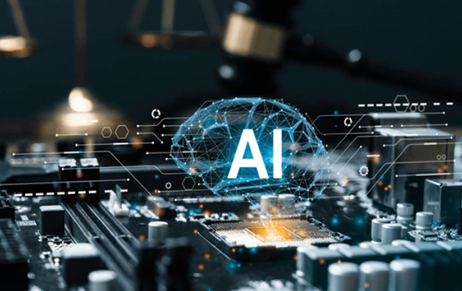In recent years, the world witnessed an exponential surge in the use of Artificial Intelligence…
The Advent of AI into Legal Jobs: A Paradigm Shift in the Legal Framework
Abstract
For all intents and purposes, the application of artificial intelligence in the legal field seems to be changing the game, disrupting age-old practices, and adding new avenues for creativity and efficiency. Here, below lies an essay on how artificial intelligence is gradually but significantly impacting the profession, from predictive analytics through document review and legal research to contract management. AI technologies based on natural language processing and machine learning make it possible for legal professionals to automate routine work, speed up legal processes, and get faster, more accurate research. Moreover, predictive analysis by AI enables attorneys to examine probable scenarios of legal disputes, thus presenting useful insights that would help them in decision making.
However, apart from such advantages, artificial intelligence does act as drawbacks in the fields of ethics and legality. Arguments regarding artificial intelligence and its role in the legal industry circulate mainly on debates regarding data privacy and security, algorithmic bias, and liability for decisions made. Decision making in artificial intelligence usually requires large datasets; hence underlying dataset integrity and whether the output is just or otherwise fair will be concerns. This is also another growing issue in the future of legal practices regarding supervisory regulation and accountabilities for the AI-driven judgments as it takes on more of the roles previously held by human attorneys over time.
AI in the Legal Domain
AI program typically human-intelligence-based operations, and it is known from its functions and applications in artificial intelligence for natural language processing, machine learning, and predictive analytics in the legal field. Major Applications of AI in Legal Work
- Legal Research: It is the AI technology within which enormous legal research can spin out in a fraction of time when measured up to how long a human lawyer would take to complete it. These tools would naturally understand natural language queries and retrieve legislation, regulations, and case law using NLP algorithms. Such systems as Westlaw Edge and ROSS Intelligence may allow attorneys to ask the kinds of questions they’d pose to each other, and they’d be given precise answers drawn from huge legal databases.
- Document Review and E-Discovery: It is the process that might take months of hard work just to evaluate materials against the relevance tag for litigation. Such AI systems automate the procedure by quickly recognizing the relevant papers and flagging any issues. It’s companies like CS Disco and Lawgeex that have come up with systems that speed up as well as improve e-discovery for legal teams.
- Contract Analysis: Besides deriving vital information from the contracts and concentrating on the risks and legal compliance, applying AI technology will make it possible to review them. These tools also help the contract managers to facilitate the processes of contract management by the lawyers’ visualization of the active tasks and feasible problems in a contract.
- Predictive Analytics: Using historical case data analysis, legal risks and litigation outcomes can be foreseen. An AI algorithm can among others, suggest the likely court outcomes based on particular scenarios by observing the previously made court rulings and identifying similar patterns. It thereby helps lawyers in finding more suitable case management strategies.
Advantages of Implementing AI in Legal Practice
A major positive feature of AI in the legal sector is that it has a lot of advantages:

Improved Productivity: AI renders lawyers the ability to engage themselves in priority work that presupposes critical thinking and knowledge by automating everyday tasks such as document review and legal research. In addition, the measure helps their firms cut operational costs and, more importantly, increases the company’s productivity.
Enhanced Accuracy: AI systems are able, with great precision, to extract valuable information from enormous databases and can correct the mistakes made by humans in jobs such as document inspection and the analysis of contracts. Accuracy is the key component for complying with legal regulations and nip in the bud expensive errors.
Improved Client Service: By employing chatbots and autoreply systems, law firms can enhance their customer service and respond to the client requests even faster. Clients build up links with office staff that could otherwise take more time through usual channels and get faster answers.
Access to Justice: AI makes the considerable step of ensuring equal opportunities allowing people to benefit from budget-friendly solutions if they otherwise have limitations regarding the legal services due to a financial basis. Moreover, cyber law and IT ethics courses would be implemented to create awareness of the ramifications of these products and to help students understand issues around technology and human rights.
Even though using AI by lawyers has many benefits, its introduction also means that there are some challenges and ethical issues that are being raised:
Bias in Algorithms:
In AI systems, bias in algorithms could be attributed to the bias in the data. More specifically, the bias is the strongest in prediction analytics programs where these programs are used to make bail or decisions about punishment. AI systems should not be biased if public trust is to be retained by the legal system.
Overdependence on technology:
Attorneys run excessively the risk of over-reliance on AI devices, forcing the ability of judgment and analyzation skills to become blunted. Attorneys have to know how they will be able to apply technology and use their knowledge properly.
The Future of AI in Legal Work
As we step forward, we know full well that AI will be a key component of the way the legal field matures. Technologies will be developed in such a way, that they’ll be, for instance, purely law-applicable.
Augmentation vs. Automation
The idea of the analogy of supplementation instead of the complete substitution of human labor by automation has become an issue mainly by the arguments raised in the discussion of the role of AI in the legal field. Apart from the tasks that would be automated in the end, even the largest part of the legal practice would become more efficient by AI systems that are made to complement humans rather than replace them. Lawyers, however, can make use of technology to support them but they stick to their own set of qualities in moral judgment, empathy, and analytical thoughts.
Conclusion
The addition of AI in the legal industry is a major change, it is not only the essence of efficiency and accuracy but also the accessibility field. Problems like bias, data privacy, and overreliance on technology really exist in this process; but, on the other hand, the positive points are very significant. As the law firms become more adept, it would not just help them in getting through their processes but it would also facilitate their clients and give them better access to justice. Smooth integration is a good approach to utilize AI as a tool for augmentation rather than a replacement. Thus, using it optimally, lawyers will be able to reach the expected ethical behaviour standards and win in the sharp competitive atmosphere. The ones who are flexible in this scenario would be the one who lead because technology and law have become close friends.
Author: Harsh Jain, in case of any queries please contact/write back to us via email to chhavi@khuranaandkhurana.com or at IIPRD.
REFERENCES
[1] https://inclusioncloud.com/insights/blog/ai-in-law-future-lawyer/
[2] https://businesslawtoday.org/2022/02/how-ai-is-reshaping-legal-profession/
[3] https://www.thomsonreuters.com/en/careers/careers-blog/how-ai-and-machine-learning- is-shaping-legal-strategy.html
[4] https://mindtitan.com/resources/blog/ai-in-law /
[5]https://pro.bloomberglaw.com/insights/technology/how-is-ai-changing-the-legal-profession /
[6] https://ideausher.com/blog/ai-in-law/



